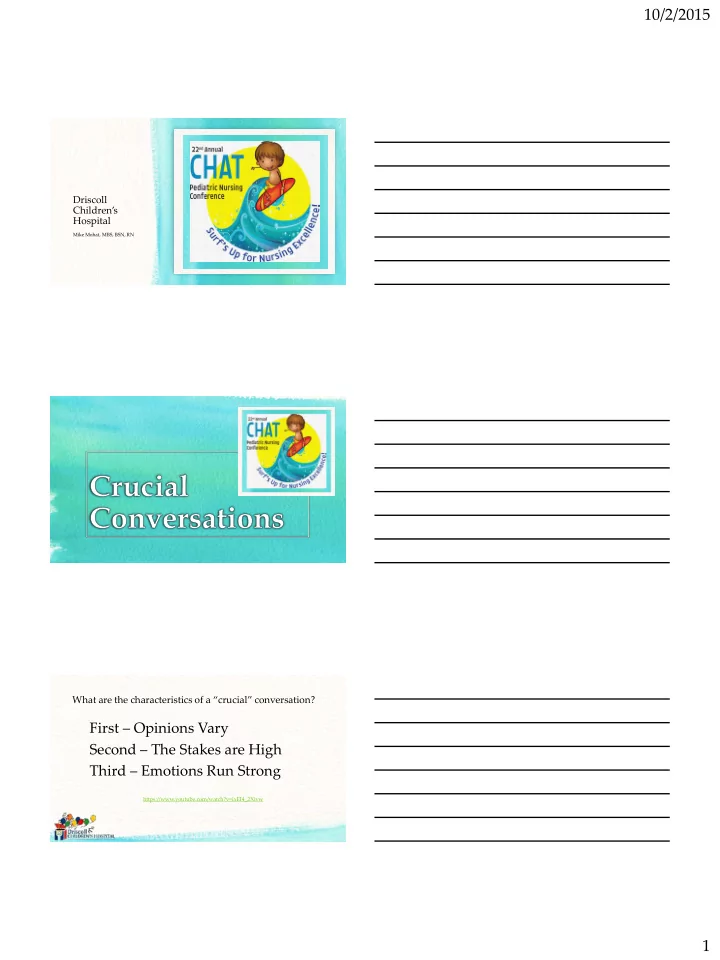

10/2/2015 Driscoll Children’s Hospital Mike Mohat, MBS, BSN, RN What are the characteristics of a “crucial” conversation ? First – Opinions Vary Second – The Stakes are High Third – Emotions Run Strong https://www.youtube.com/watch?v=ixEI4_2Xivw 1
10/2/2015 Common Lingo Attitude – mental frame of mind – unseen but perceived Behavior – an observed action or deed Performance – the action of carrying out a task for function 2
10/2/2015 Why are Crucial Conversations Difficult? Mental and emotional drains Time consuming Don’t want to be the “bad guy” The Result? Hope it will go away on it’s own so we ignore Things go from bad to worse Don’t let it fester and spread Why don’t crucial conversations tend to go well? Emotions tend to rule Your body physically reacts We are under pressure We are stumped We act in self defeating ways 3
10/2/2015 Front-line management is one of the most difficult jobs in the world Common Reasons for Crucial Conversations Inappropriate Behavior Workplace harassment Violation of workplace policy or guidelines Patient/Family Complaints Staff/Physician Complaints Consider Both Sides First Be your own “devil’s advocate” 4
10/2/2015 Set the tone – How have you have been as a leader up to this point? Have you exhibited a respectful and appreciative demeanor prior to this encounter. Do you “Walk the Talk” • Silence • Victim • Villain • Violence – you must make clear that destructive behavior will not be tolerated How do I open the conversation? State what you want to discuss. “I want to talk with you about...” Share a specific example. “I heard…” Explain what is bothering you. “I am concerned about..” Describe the importance. “From my perspective this is important because...” Own your own stuff. “I have some responsibility… For this, I am sorry.” Then STOP and Listen - Make it safe for them to talk “Seek first to understand…” Listen with curiosity and care; not judgment Listen for what is NOT being said All Feelings are legitimate, it is not about what we feel but what we do that matters. Ask open-ended questions “Tell me more…” “Help me understand…” 5
10/2/2015 The Real Focus on personal accountability, not blame Personal accountability = accepting responsibility for my own actions and non-actions They have to “own” it How do I end the conversation? Summarize what was learned: what if you had a “do over”? Re-state the importance. Ask for what you want next. Make an agreement. Say, “Thank You.” What is the consequence Check back in __________ Say, “Thank You.” . Follow through Outcomes Redemption to Termination Growth Document 6
10/2/2015 References Crucial Conversations Tools for Talking When Stakes Are High Edition: 2nd 2012 Kerry Patterson, Joseph Grenny, Ron McMillan, Al Switzler Crucial Accountability: Tools for Resolving Violated Expectations, Broken Commitments, and Bad Behavior Edition: 2 nd 2013 Kerry Patterson, Joseph Grenny, Ron McMillan, Al Switzler, David Maxfield A Portable Mentor for Organizational Leaders 2003 Kendall L. Stewart Instilling Accountability on the Front Line 2007 The Advisory Board Company References Crucial Conversations (Kerry Patterson, Joseph Grenny, Ron McMillan, and Al Switzler) Difficult Conversations (Douglas Stone, Bruce Patton, Sheila Heen, and Roger Fisher) Fierce Conversations (Susan Scott) Fierce Leadership (Susan Scott) 7
Recommend
More recommend